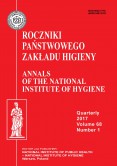Rocz Panstw Zakl Hig 2015, 66(2): 159-165
Selected indices of health status in preschool children from Pila and their families as a risk factor of diet-related diseases.
[Selected indices of health status in preschool children from Pila and their families as a risk factor of diet-related diseases.]
ABSTRACT
Background. Diet-related diseases have their origin as early as in childhood; therefore, preventing them should start from the first years of life. Each assessment of dietary intake should be preceded by assessment of health status indices, especially familial diet-related diseases prevalence.
Objective. The objective of this study was to analyse selected indices of health status in preschool children from Pila and their families in order to assess the risk of developing diet-related diseases.
Material and methods. The studied population comprised 128 children aged 4 to 6 years, 63 girls and 65 boys, who attended two preschools in Pila. Parents filled in questionnaires concerning selected indices of health status of the children and their families. Statistical analysis was carried out by means of the IBM SPSS Statistics 21.0 computer programme. The studied children were divided according to gender.
Results. Statistically significantly higher percentage of boys than girls took medicines, 41.5% vs 21.0%. As many as 49.6% of mothers and 33.1% of fathers had higher education and most of the parents assessed the economic status of the family either as good or very good. Most of the studied children took dietary supplements. The highest percentage of both girls and boys, 34.2% and 33.8%, respectively, took vitamin and mineral supplements. The prevalence of familial diet-related diseases ranged from 3.2% in the case of hyperlipidaemia to 65.6% in the case of hypertension.
Conclusions. The high percentage of the studied preschoolers who took dietary supplements shows the need to educate parents about the adverse effects of excessive intake of these nutrients and about the necessity to take such supplements only on recommendation of the paediatrician. The analysed indices of health status of the studied children and their families show the need to pay much attention to balanced diet and daily physical activity in order to prevent diet-related diseases in the studied preschoolers and their families.
STRESZCZENIE
Wprowadzenie. Choroby dietozależne mają swój początek już w dzieciństwie, dlatego zapobieganie im powinno rozpocząć się od najwcześniejszych lat życia. Każda ocena sposobu żywienia powinna być poprzedzona oceną wskaźników stanu zdrowia, szczególnie oceną częstości występowania chorób dietozależnych w rodzinie.
Cel. Celem pracy była analiza wybranych wskaźników stanu zdrowia dzieci w wieku przedszkolnym z Piły oraz ich rodzin pod kątem ryzyka rozwoju chorób dietozależnych.
Materiał i metody. Badaniami objęto 128 dzieci w wieku od 4 do 6 lat, w tym 63 dziewczynki i 65 chłopców, uczęszczających do dwóch przedszkoli w Pile. Rodzice wypełnili ankiety dotyczące wybranych wskaźników stanu zdrowia dzieci i ich rodzin. Statystyczną analizę wyników przeprowadzono przy pomocy programu komputerowego IBM SPSS Statistics 21.0 Badaną populację podzielono w zależności od płci.
Wyniki. Statystycznie istotnie większy odsetek chłopców niż dziewczynek korzystał z lekarstw, 41,5% vs 21,0%. Aż 49,6% matek i 33,1% ojców charakteryzowało się wyższym wykształceniem, a ponadto większość rodziców badanych dzieci oceniła sytuację materialną rodziny jako dobrą lub bardzo dobrą. Większość badanych dzieci stosowała suplementy diety. Największy odsetek zarówno dziewczynek, jak i chłopców, odpowiednio, 34,2% i 33,8%, zażywał suplementy witaminowo-mineralne. Odsetek rodziców, którzy poinformowali o występowaniu chorób dietozależnych w rodzinie wahał się od 3,2% w przypadku hiperlipidemii do 65,6% w przypadku nadciśnienia tętniczego.
Wnioski. Wysoki odsetek badanych dzieci przedszkolnych, które spożywały suplementy witaminowe i mineralne wskazuje na potrzebę prowadzenia edukacji rodziców w zakresie niekorzystnych skutków nadmiernego spożycia mikroskładników oraz konieczności stosowania suplementów tylko po konsultacji z lekarzem pediatrą. Analizowane wskaźniki stanu zdrowia badanych dzieci i ich rodzin świadczą o potrzebie zwrócenia większej uwagi na zbilansowaną dietę i regularną aktywność fizyczną, aby zapobiec chorobom dietozależnym w badanej grupie przedszkolaków i ich rodziców.
Downloads: 2009


